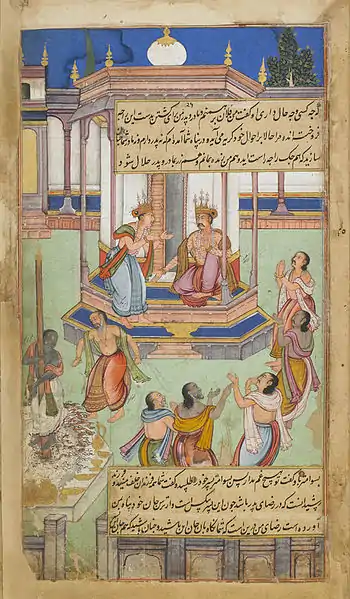Ambarisha
Ambarisha (Sanskrit: अम्बरीषः, Ambarīṣa), in Hindu mythology, was an Ikshvaku king and son of Mandhatri.[1] He is believed to have conquered the whole world in a week.[2] He lived in Treta Yuga.
| Ambarisha | |
|---|---|
 King Ambarisha offers the youth Sunahshepa in sacrifice | |
| In-universe information | |
| Family | Mandhata (father) |
Bhagavata Purana legend

According to the Bhagavata Purana, he was a great devotee of Vishnu and adhered firmly to the truth. Being pleased with his devotion, Vishnu had given his Sudarshana Chakra to Ambarisha, who worshiped the Lord's weapon with great devotion. Once, Ambarisha performed the Dvadashi Vrata at Vrindavan, which required that the king must start a fast on Ekadashi and break it at the start of Dvadasi and feed all the people. As the moment of breaking the fast was drawing near, the mighty sage Durvasa arrived and was received with all honours by Ambarisha. Durvasa agreed to the king's request to be his honoured guest, and asked the king to wait until he finished his bath in the Yamuna river and returned. As the auspicious moment approached when the king had to break his fast to fulfill the vow of the vrata, Durvasa did not turn up. On the advice of his priests, the king broke his fast by taking a little water and waited for the arrival of sage Durvasa to offer him food.
Durvasa, who was well known for his short temper, felt that Ambarisha had violated the respect due to a guest by breaking his fast before the guest had taken his meal, and in his rage created a demon to kill Ambarisha, out of a strand of his hair. Because Ambarisha was a great devotee, the Sudarshana Chakra intervened, destroyed the demon and started chasing Durvasa himself. Durvasa went to Brahma and Shiva for protection. Both pleaded their inability to save him. He went to Vishnu himself, who said that he could do nothing as he was bound by the blemishless devotion of Ambarisha and suggested to the sage to seek the pardon of the king. Durvasa went to Ambarisha, who prayed to Lord Vishnu to recall the Sudarshana and save Durvasa. Thus Durvasa's life was spared. [3]
Ramayana legend
The Ramayana contains a variation of an Aitareya Brahmana legend about the king Harishchandra. In the Ramayana version, the king is named Ambarisha, instead of Harishchandra. According to this legend, Ambarisha was once engaged in a Ashvamedha Yagna at his capital Ayodhya. During this ceremony, the horse of Ashwamedha was stolen by Indra. The priest conducting the ceremony told the king that he needed to find the animal, or perform a human sacrifice to avert the misfortune resulting from the situation. After being unable to find the animal, the king bought Shunahshepa, the son of a sage, for the sacrifice. Shunahshepa survived the sacrifice by reciting two hymns that the sage Vishwamitra had given him.[4][5]
References
- Pargiter, F.E. (1972) [1922]. Ancient Indian Historical Tradition, Delhi: Motilal Banarsidass, p.92.
- Gopal, Madan (1990). K.S. Gautam (ed.). India through the ages. Publication Division, Ministry of Information and Broadcasting, Government of India. p. 66.
- Prabhupada, Bhaktivedanta Swami (1995). Srimad Bhagavatam - Canto Nine. The Bhaktivedanta Book Trust. p. 85-170. ISBN 978-81-8957491-8.
- Yves Bonnefoy & Wendy Doniger (1993). Asian Mythologies. University of Chicago Press. p. 54. ISBN 9780226064567.
- David Shulman (1993). "Sunahsepa: The Riddle of Fathers and Sons". The Hungry God: Hindu Tales of Filicide and Devotion. University of Chicago Press. pp. 87–105. ISBN 9780226755717.
External links
- Bhagavata Purana, Skanda 9, Adhyaya 4
- Story of Ambarisa
